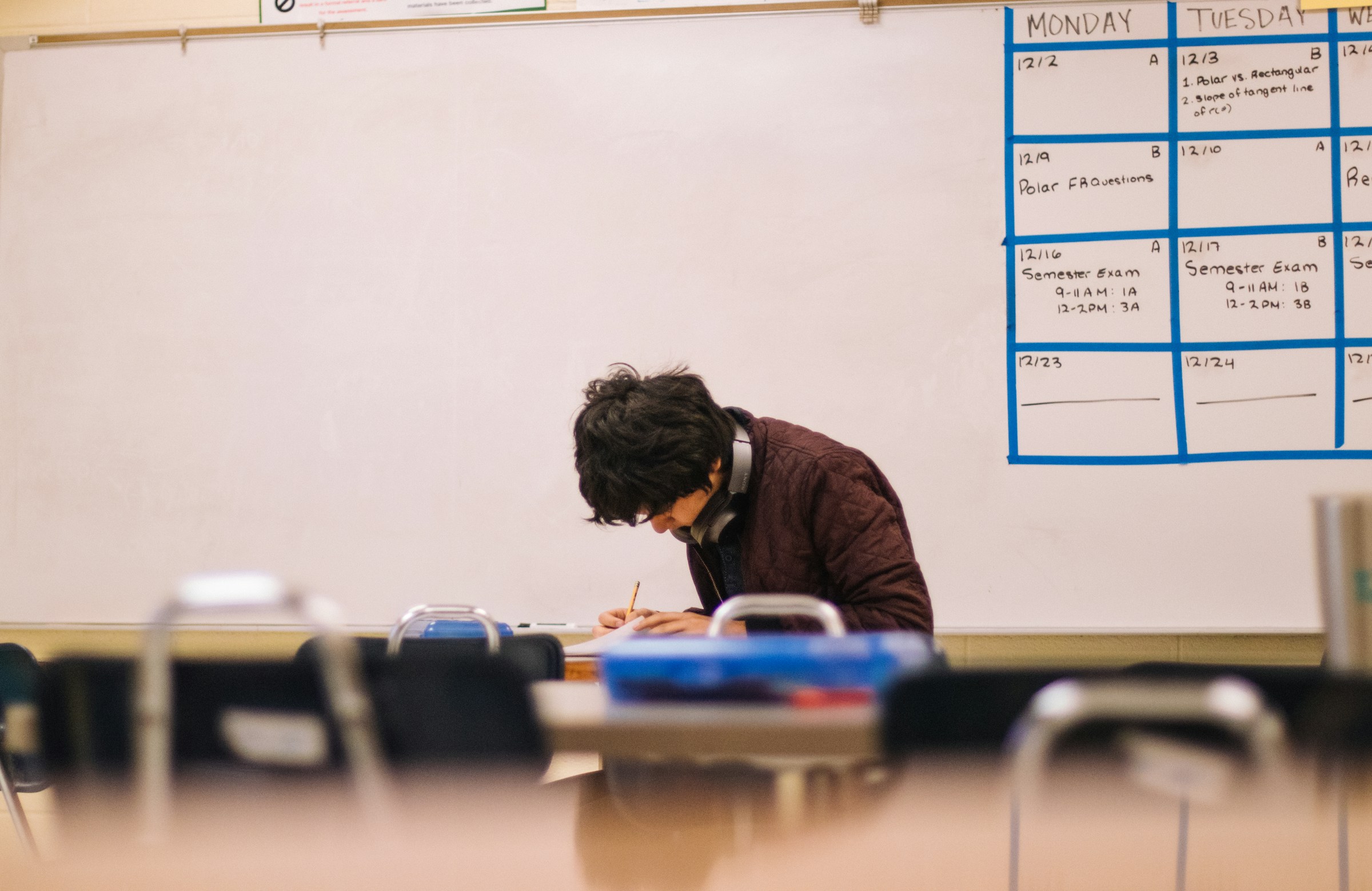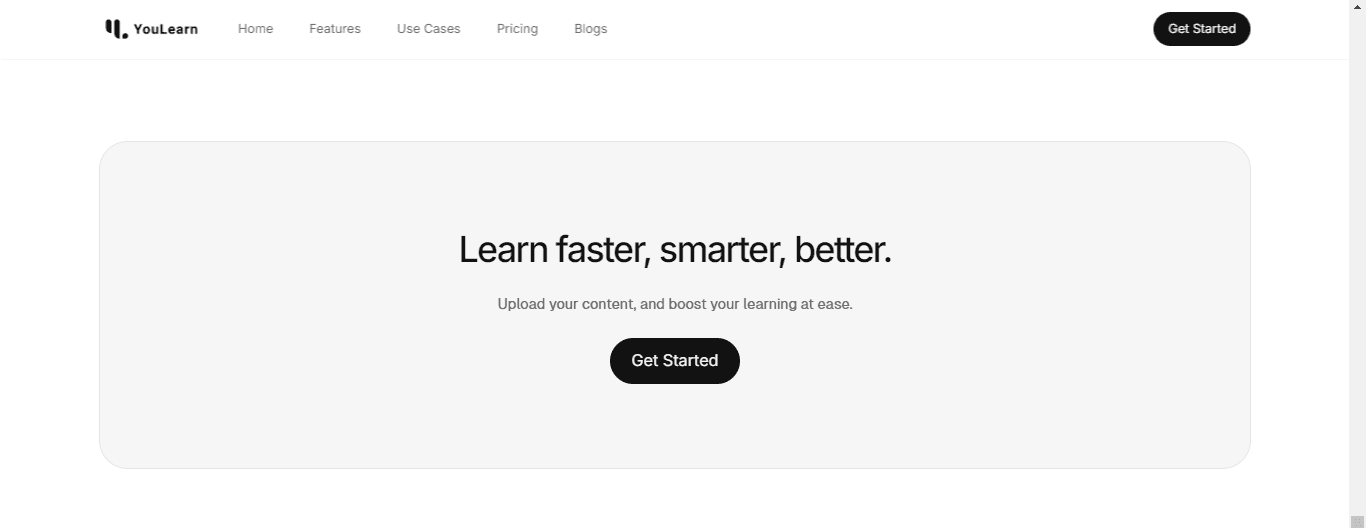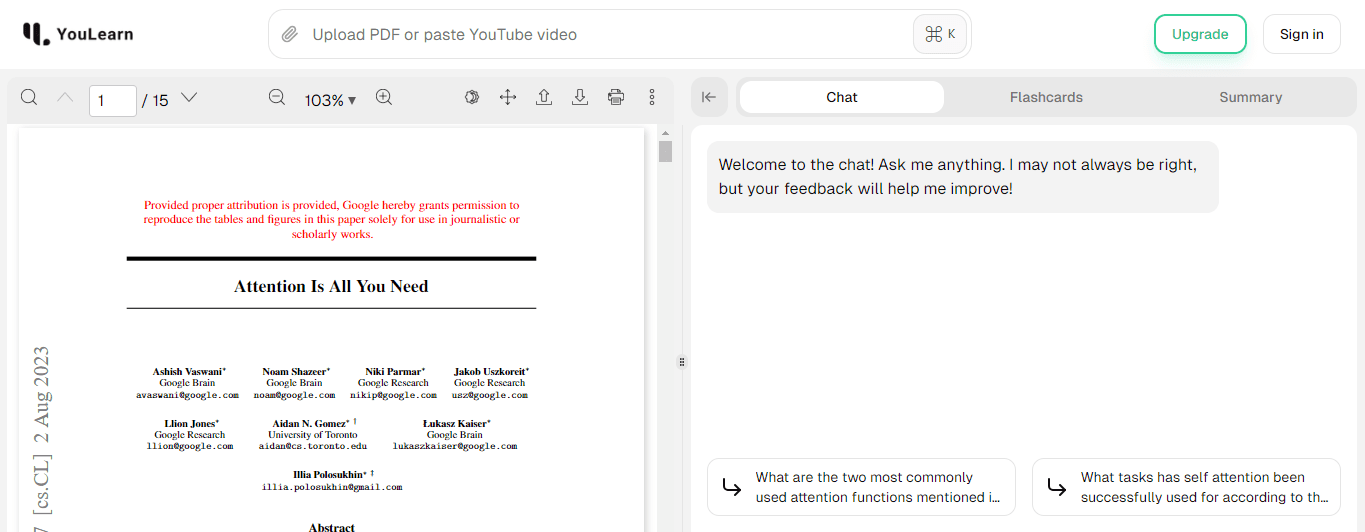12 Best High School Study Skills Every Student Must Have
Sep 29, 2024

YouLearn Team
How to be a better student? Many students need help adjusting to the increasing academic demands of high school. It can sometimes feel overwhelming with more challenging classes and less teacher handholding.
However, developing practical study skills can help students survive and thrive in high school. This guide will explore the significance of high school study skills within the broader context of being a better student. You’ll also learn about YouLearn's personal AI tutor, which can help students develop practical study skills for high school success.
Table of Contents
What Is The Best Study Method For High School Students?

YouLearn is your AI tutor, designed to supercharge your learning from YouTube videos, PDFs, and slides. Our AI chats with you about the content, provides quick summaries and breaks information into digestible chapters.
Whether you are a college student or a self-learner, we help you grasp material faster and more effectively. Just upload your content, and our AI transforms it into an interactive learning experience. With YouLearn, you're set to learn more intelligently, not more complicated. Learn anything with ease for free today with YouLearn's personal AI tutor.
Spaced Repetition
One of the most critical study techniques to remember is spaced repetition. Rather than cramming everything into one study session, spacing out your learning over some time can help reinforce your understanding of the material and improve your retention. You can achieve this by breaking your study sessions into shorter, more frequent sessions over a few days or weeks before an exam.
Active Recall
This technique involves testing yourself on the material you’ve learned rather than just re-reading it. Examples of active recall include flashcards, practice questions, and quizzes. By actively engaging with the material, you’ll be able to identify areas where you need to focus your attention and improve your understanding of the concepts.
Interleaving
Interleaving is another effective technique. This involves mixing up different topics or problems during a study session. For example, if you’re studying for a history exam, you could alternate between studying different historical events rather than just focusing on one topic at a time. This technique helps to strengthen connections between various pieces of information and improve retention.
Elaboration
Elaboration is another technique that can help retain information. This involves expanding upon the information you’ve learned by connecting to other knowledge, asking questions, and explaining concepts in your own words. By elaborating on what you’ve learned, you’ll be able to understand the material better and retain it more effectively.
Using Visual Aids
Visual aids can also be a helpful study technique. Diagrams, mind maps, and graphs can help you understand and remember complex information better. They can also help you organize information that makes sense to you and identify critical connections between different pieces of information.
Teaching Others
Teaching them what you know can effectively boost your studies if you can find someone willing to listen and learn. By explaining concepts to others, you’ll be able to identify areas where you need to focus your attention and reinforce your understanding of the material.
Look After Yourself
while this isn’t technically a study technique, taking care of your physical and mental health is still essential. Getting enough sleep and exercise can significantly impact your ability to learn and retain information. Take breaks when needed, and don’t be afraid to ask for help if you struggle with a particular subject.
Related Reading
• How to Pass a Test
• How to Be a Good Student
• Back to School Tips
What Is The Best Thing To Study In High School?

English: Unlocking the Key to High School Success
Take English every year. Traditional courses, such as American and English literature, help improve your writing skills, reading comprehension, and vocabulary. To be a better student and increase your chances of college, you should aim to excel in these courses.
Math: The Backbone of Many College Admission Tests
Algebra and geometry help you succeed on admission tests and in college math classes. Take them early to have time for advanced science and math, showing colleges that you're ready for higher-level work.
Most colleges want students with three years of high school math. The more competitive colleges prefer four years. Take some combination of the following: Algebra I, Algebra II, Geometry, Trigonometry, Precalculus, Calculus.
Science: More Than Just Memorization
Science teaches you how to think analytically and apply theories to reality. Colleges want to see you’ve taken at least three years of laboratory science classes. A good combination includes a year of Biology, Chemistry or physics, Earth or physical science. Competitive schools expect four years of lab science courses, which you may be able to get by taking advanced classes in these same areas.
Social Studies: Understanding the World We Live In
Improve your understanding of local and world events by studying the cultures and history that helped shape them. Here’s a suggested high school course plan: U.S. History, U.S. Government, World History and Geography, and Economics.
Foreign Languages: Challenging Yourself to Do More
Studying a foreign language shows you're willing to stretch beyond the basics. Many colleges require at least two years of study in the same foreign language, while others prefer more.
The Arts: Using Your Creative Side to Get Ahead
The arts help you recognize patterns, learn to notice differences and similarities and exercise your mind in unique ways. Some colleges require or recommend one or two semesters in the arts. Choices include studio art, dance, music, and drama.
Advanced College Courses: Getting Comfortable with College-Level Work
Enroll in challenging high school courses, such as honors, AP, or IB programs, to prepare for college-level work. Find out about taking college classes in high school or at a local college.
Learn Anything With Ease for Free Today with YouLearn's Personal AI Tutor
YouLearn is your AI tutor, designed to supercharge your learning from YouTube videos, PDFs, and slides. Our AI chats with you about the content provides quick summaries, and breaks information into digestible chapters.
Whether you are a college student or a self-learner, we help you grasp material faster and more effectively. Just upload your content, and our AI transforms it into an interactive learning experience. With YouLearn, you're set to learn more intelligently, not more intricate. Learn anything with ease for free today with YouLearn's personal AI tutor.
12 Best High School Study Skills Every Student Must Have

1. Mastering Time Management for Academic Success

High school can be a whirlwind, and you probably feel it. Your schedule can fill up quickly between classes, homework, extracurricular activities, and family obligations. That’s where strong time management skills come into play. A daily planner can help you map out your days to make time for all your responsibilities.
Whether that’s a virtual calendar, such as Google Calendar, or a physical planner that travels everywhere with you, use it and stick to it as best you can. Schedule in your free time, test prep hours, everything you can think of. As you’re studying, also try out the Pomodoro Technique, which helps you break down large tasks into smaller blocks of work so it’s more manageable, and you’re rewarded with breaks.
This way, you can visualize how each day’s hours get spent, and you’ll find a sense of accomplishment ticking each task off. Make sure you’re budgeting in time for adequate sleep! You won’t accomplish your tasks as efficiently without enough sleep.
2. Cultivating Healthy Study Habits
Always be prepared for class and attend classes regularly. No cutting! Complete assignments thoroughly and promptly. Review your notes daily rather than cramming for tests the night before. Set aside quiet time each day to study, even if you don't have homework or a test the next day!
3. Task Prioritization and Getting Organized
Take time to reevaluate your to-do list. What’s the most pressing item there, and which ones can wait? Is it more important to prepare for your AP US History exam on Friday or complete your Honors Literature essay, which is due in two weeks? Since you have your daily planner dialed in (ideally a few weeks ahead), you should be able to look ahead at what’s coming and figure out what needs to be tackled first.
Some students work best by getting the more complex tasks out of the way first, creating a sense of accomplishment, and lightening the load going forward. Some students prefer tackling easy tasks first to quickly cross off a few things on their long list. Figure out which system works best for you and stick to it. Most importantly, you look at your upcoming tasks holistically and determine what needs to be handled first.
4. The Ability to Set Attainable Goals
It's essential to set goals that are attainable. Setting unreasonably high goals is a trap—you'll be frustrated and disappointed.
5. Note Taking and Note Reviewing
We’re all familiar with being in class, feeling like we understand a concept, returning home to tackle our homework, and feeling lost on the same material. This is where diligent and organized note-taking comes into play. Not only does note-taking help you review class material after first hearing it, but the actual writing and taking notes of what you’re hearing will help you absorb and hold onto more of it rather than the information flowing in one ear and out the other.
Of course, it can be hard to keep organized notes when the teacher is moving quickly in class. This is why Crimson recommends reviewing your notes each night. Go through and highlight key points, color code particular topics, and add post-it notes to areas you need more clarity on. Your notes are your surest guide to success in your classes.
6. Concentration
Listen to your teacher and stay focused. Be sure that you understand the lesson. If you don't understand something, ask questions! You've heard it before, but "the only dumb question is the one you don't ask" is true. If you've been paying attention, it won't be a dumb question.
7. Setting Up Your Space for Success
To succeed, ensure your study space is set up to your liking. Clear off all your distractions, and have all the materials you need: think textbooks, notebooks, highlighters, your favorite snack, etc. If your desk is disorganized, it can be challenging to focus on what matters. We recommend having a study space separate from where you like to relax or sleep. This way, when it’s time to work, you come to your study space, and when it’s time to relax, you can disconnect from your work and recharge.
8. Completion of Assignments
Teachers assign homework for a reason. While it may seem like "busywork" sometimes, it has a purpose. Put your homework to good use. Remember, you'll only get out of it what you put into it!
9. Motivation and Rewards
Provide yourself with rewards for your hard work. Did you bust out three hours of studying for that upcoming test? Treat yourself and allow your brain to recharge. Maybe that means a walk around the neighborhood, eating your favorite snack, or watching a favorite show. Just make sure you come back to your work when you need to.
Remember your long-term goals and why each of these small tasks matters. Small successes add up to your overall goals. Keep the long game in your mind while focusing on bite-size functions that will get you there. Don’t forget to reward yourself for the small wins to keep yourself motivated and charging forward.
10. Organizational Skills
Keeping yourself organized will save you valuable time and allow you to do everything you need to do. Remember: "There is a place for everything and everything in its place." Keep all your study materials (calculator, planner, books, notebooks, laptop, etc.) in one convenient location.
11. Form Study Groups
What happens when you get stuck on a concept you don’t fully understand and are stuck at home without access to your teacher? This is where study groups can come in handy. Forming study groups with a few classmates will help reinforce concepts, allow everyone to talk through questions, and solidify your understanding. Reviewing aloud can immensely help students absorb the material and fully grasp it. It’s also an excellent opportunity to help out other classmates while you continue reviewing the material. It can also break up the monotony of studying for hours alone.
12. Commitment
You've started the course, but you need to complete it. Do the best -- and get the most out of it! Your commitment will pay off in the end.
10 Best High School Study Tips For Good Grades

1. Use YouLearn AI

YouLearn is your AI tutor designed to supercharge your learning from YouTube videos, PDFs, and slides. Our AI chats with you about the content, provides quick summaries and breaks information into digestible chapters. Whether you are a college student or a self-learner, we help you grasp material faster and more effectively. Just upload your content, and our AI transforms it into an interactive learning experience. With YouLearn, you're set to learn more intelligently, not harder. Learn anything with ease for free today with YouLearn's personal AI tutor.
2. Stick to a Set Schedule
Establishing a consistent study routine helps you progress academically and mentally, just like training for a sport. Your brain builds pathways and habits over time; studying is about building mental muscles and endurance. Getting into a fixed study habit will help you improve your concentration and mental stamina over time. And, just like any other training, your ability to study only improves with time and dedicated effort.
Many activities are good for us, but we often, for whatever reason, dread doing them. Whether this is exercising, doing chores, or studying, it's a good idea to set yourself a schedule and stick to it no matter how you're feeling at the moment. It's easy to put off these activities for a thousand reasons: you're busy doing something else, you're tired, you have a headache, you're not in the mood. But the more you hold yourself to a set schedule, the more likely you'll do what you need to without making endless excuses.
Aside from doing homework, set aside 50 to 75 minutes to study daily and stick to your schedule. You'll find the study rhythm that works best for you but do know that you don't necessarily have to sit down and eek out those minutes all at once. You can decide to split the time into smaller segments throughout the day, or if you work better at completing tasks and moving on, you can choose to get your studying done all at once.
3. Schedule Your Studies in Smaller Increments Over a Long period
By committing 50 to 75 minutes to study daily (and sticking to your schedule!), you'll avoid burning out your mental energy and cramming for hours at night before a test. Not to say that cramming your material can't occasionally "work." Some people can cram for a test the night before and do well, but studying this way will only store the information in your short-term memory rather than your long-term.
This means that, by cramming, you can need help to stay apprised of the material as the semester progresses (especially in classes where previous information builds on later information, such as in science, math, or history classes). The long-term effect of forcing your brain to cram necessary details at once will make studying for finals difficult and force you to re-learn a semester's worth of material.
Rather than being able to simply review it, making a habit of cramming material at the last minute will only increase your stress and make you feel as though you have to play "catch-up constantly." By sticking to a schedule of studying for a reasonable amount of time over the entire semester or term, you can better store and recall the information you need, thereby reducing some of the stress from schoolwork, tests, and studying.
4. Practice Good Study Hygiene
Good study hygiene is about maintaining a clear separation between work and rest. This allows you to focus on necessary tasks while minimizing stress and anxiety for the rest of your life. We've already discussed keeping a dedicated study space, but now we must keep those areas as "hygienic" as possible.
How? A few critical rules for setting up your study environment are: Ensure you don't study in or on your bed. Studying in sleeping areas is the very definition of NOT maintaining a clear separation between work and rest, and most often leads to increased stress levels and insomnia. This, in turn, can decrease your concentration and ability to study in the long term.
By blurring the lines between study time and free time, you'll only create spillover stress for yourself and be stuck in a cyclical effect of non-productivity and anxiety. So keep your study location to a desk, a table, or even a couch, so long as you aren't anywhere on your bed.
5. Rewrite or Rephrase the Material in Your Own Words
It can be easy to get lost in a textbook and look back over a page only to realize you don't remember what you just read. But luckily, that can be remedied. For classes that require you to read large bodies of text, such as history, English, or psychology, make sure to stop periodically as you read. Pause at the end of a paragraph or section without looking!—think about what the text just stated.
Re-summarize it in your own words. Now, I glance back over the material to ensure I summarized the information accurately and remembered the relevant details. Make a mental note of whatever I missed, then move on to the next section. You may also want to make a bulleted list of the pertinent information instead of just rephrasing it mentally or aloud. Without looking back at the textbook, jot down the essentials of the material you just read.
Then, review the book to ensure you have all the necessary information. Whether you summarize aloud or write down your information, rephrasing the text is an invaluable study tool. By rephrasing the text in your own words, you can be sure you're remembering the information and absorbing its meaning rather than just rote copying the information without truly understanding or retaining it.
6. Teach the Material to Someone Else
Teaching someone else is a great way to distill your thoughts and summarize the information you've been studying. And, almost always, teaching someone else shows you that you've learned more about the material than you think! Find a study buddy, a patient friend or relative, or even a figurine or stuffed animal, and explain the material to them as if they're hearing about it for the first time.
Whether the person you're teaching is natural or not, teaching material aloud to another human being requires you to reframe the information in new ways and think more carefully about how all the elements fit together. Running through your material this way—especially if I do it aloud—helps you lock it in your mind more easily.
7. Quiz Yourself With Flashcards
Making flashcards is an oft-used study tool, and for excellent reason! Making your flashcards can not only help you retain information just by writing it down but will also help you connect pertinent pieces of information. So, flashcards are the way to go for any subject in which you must remember the connections between terms and information, such as formulas, vocabulary, equations, or historical dates.
To make the best use of your flashcards, use the Leitner Method so you save time studying what you already know. To employ this method, quiz yourself with your flashcards and separate the cards into two different piles. In Pile 1, place the cards you knew and answered correctly; in Pile 2, put the cards I didn't know the answers to. Now, go back through the cards, but only study the cards from Pile 2 (the "didn't know" pile).
Separate these again as I go through them into Pile 1 (know) and Pile 2 (don't know). Repeat the process of only studying "don't know" cards until more and more cards can be added to the "know" pile. Once all the cards are in the "know" pile, go through the whole pile again to ensure I've retained the information on all the cards.
8. Make Your Diagrams, Formula Sheets, and Charts
Reconstituting information into pictures can help you see and understand the material in new and different ways. For math and science classes, you may want to make yourself a formula sheet in addition to making flashcards. Flashcards will help me to remember each formula in isolation, but making one catch-all formula sheet will give me a handy study reference tool. Making one will help me retain my information by writing it down.
The bonus is that if I'm more of a visual/picture learner, a formula sheet can help me remember my formulas by recalling how they're situated. To help me to place my science processes, I created my diagrams. For instance, I draw my cell and label the components for a biology class or make my Krebs cycle diagram. These pictures will typically be in my textbooks, so examine the picture I'm given and then create my diagram without looking at the textbook.
See how much I've been able to accurately recreate and then do it again until it's perfect. Sometimes, making my charts and diagrams means recreating the ones in my textbook from memory, and sometimes, it means putting different pieces of information together myself. Whatever the diagram type and the class, writing my information and making pictures will help lock the material in my mind.
9. Study New Material Within 24 Hours
To maintain your knowledge of the class material throughout the term, make life easier on yourself by reviewing any new information you learn on the same day you learn it. Reviewing new material within 24 hours will help me retain much more of what I learned than if I were to review the same information later. So, I will dedicate a portion of each study time to reviewing the information I learned that day in my classes.
School bombards you with new material every day. Even if I'm interested in the new material as I'm learning it, it's too easy to let anything new slip away when I have so much to think about. But once the information has been pushed to the back burner of my mind, my brain will generally discard it rather than store it in my long-term memory.
To combat this "curve of forgetting," take notes in class and review the material that night. This will help lock the information into my long-term memory and serve me well in the future. A few minutes in the here and now will save me hours of learning the material later.
10. Know When to Move On
There will always come a point in your studies where you must put down the book and move on simply. As always, life is about balance, and eventually, you'll see diminishing returns on your study efforts if you spend less time on one particular topic/class/chapter. At some point, your time will be better spent studying for other classes or engaging in an alternate study task.
Keep studying until your scheduled time, but turn your focus to a different study topic or switch your attention from quizzing yourself with flashcards to making a diagram instead. It's not always easy to see, but you'll get better and better at realizing when you've hit this stopping point (and not the point five minutes into studying when I'm bored) and are no longer retaining focus or information. It may take time, but you'll get there.
How To Improve Your Learning Skills In High School

1. Improve Your Memory
Boosting your memory can improve your learning. Strategies like eliminating distractions and structuring study sessions to avoid cramming can help. Research has identified several additional memory-boosting techniques, including:
Getting regular physical exercise, which is linked to improvements in memory and brain health
Spending time socializing with other people
Getting enough sleep
Organizing the information you are studying to make it easier to remember
Use elaborative rehearsal when studying: when you learn something new, spend a few moments describing it to yourself in your own words
Using visual aids like photographs, graphs, and charts
Reading the information you are studying out loud
For example, you might use general learning techniques like setting aside quiet time to study, rehearsing, and reading information aloud. You might combine this with strategies that foster better memory, such as exercising and socializing.
2. Mix it Up
Varying your learning routine, locations, and materials can improve your studying. Many students have a fixed time and place to study. However, research has shown that varying your study location—home in a different room, school, or library—can improve learning. Similarly, occasionally changing the time of day you study, and the materials you use—laptop, pen, and paper, speaking into a voice recorder—also boosts learning.
3. Use Self-Testing
Self-testing is a strong, proven learning technique. You can test yourself by remembering what you were learning or explaining it aloud to yourself or someone prepared to listen. You can get friends to quiz you. One of the benefits is that you can get immediate feedback on whether you are right or wrong.
4. Keep Learning New Things
One surefire way to become a more effective learner is to keep learning. Research has found that the brain can produce new brain cells, a process known as neurogenesis. However, many of these cells will eventually die unless a person engages in effortful learning.
These cells are kept alive and incorporated into brain circuits by learning new things. For instance, if you want to learn a new language, it is essential to keep practicing the language to maintain the gains you have achieved. This use-it-or-lose-it phenomenon involves a brain process known as pruning. In pruning, specific pathways in the brain are maintained while others are eliminated. If you want the new information you learned, stay put and keep practicing and rehearsing it.
5. Learn in Multiple Ways

Another good strategy is to focus on learning in more than one way. For example, instead of just listening to a podcast, which involves auditory learning, find a way to rehearse the information both verbally and visually. This might include describing what you learned to a friend, taking notes, or drawing a mind map. You’re further cementing the knowledge in your mind by knowing in multiple ways.
For example, if you are trying to pick up a new language, try varying learning techniques such as listening to language examples, reading written language, practicing with a friend, and writing down your notes. One helpful tip is to write your notes on paper rather than typing on a laptop, tablet, or computer. Research has found that longhand notes can help cement information in memory more effectively than digital note-taking.
6. Build on Previous Learning
Use relational learning to build on what you already know. This involves relating new information to things that you already know. For example, suppose you are learning a new language. In that case, you might associate the new vocabulary and grammar you are learning with what you already know about your native language or other languages you may already speak.
7. Gain Practical Experience
For many students, learning typically involves reading textbooks, attending lectures, or researching in the library or online. While seeing information and writing it down is essential, putting new knowledge and skills into practice is one of the best ways to improve learning.
If it is a sport or athletic skill, perform the activity regularly. If you are learning a new language, practice speaking with another person and surround yourself with language-immersion experiences. Watch foreign-language films and talk with native speakers to practice your budding skills.
Related Reading
• Tips for School
• How to Do Good in School
• College Study Tips
• Best Study Method
• Study Strategies for High School Students
• Active Study Methods
Learn Anything With Ease for Free Today with YouLearn's Personal AI Tutor

YouLearn is your AI tutor, designed to supercharge your learning from YouTube videos, PDFs, and slides. Our AI chats with you about the content, provide quick summaries, and breaks information into digestible chapters. Whether you are a college student or a self-learner, we help you grasp material faster and more effectively.
Just upload your content, and our AI transforms it into an interactive learning experience. With YouLearn, you're set to learn more intelligently, not more complicated. Learn anything with ease for free today with YouLearn's personal AI tutor.
Related Reading
• High School Tips
• How to Study by Yourself
• How to Pass School
• How to Study Better in College

